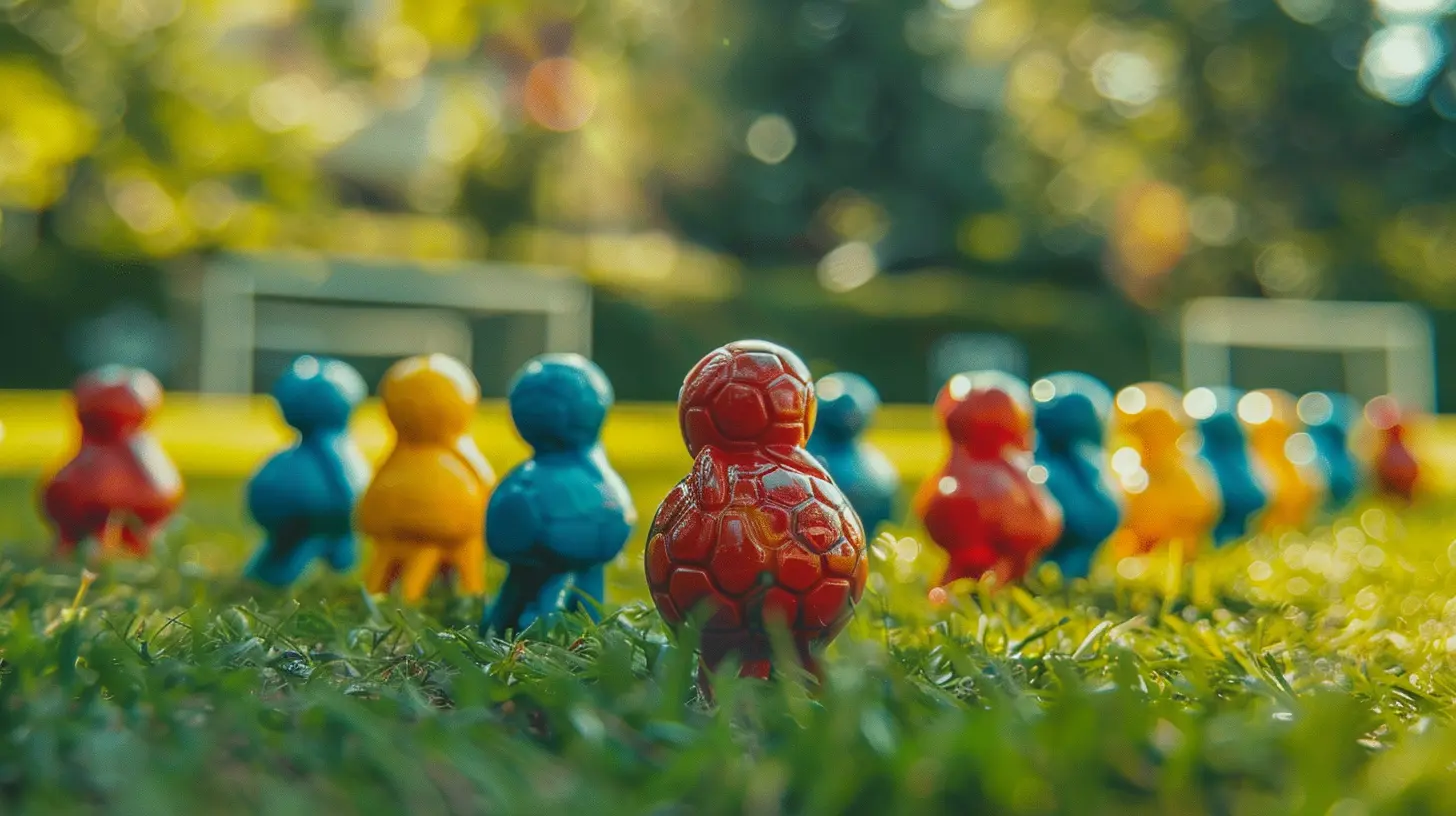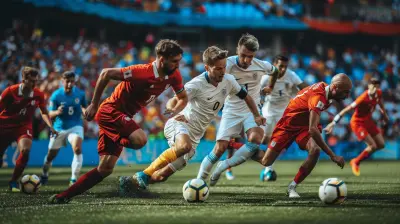The Importance of Communication in Team Success
10 June 2025
Let’s cut to the chase—if your team can’t talk, your team can’t win. Period.
Whether we’re talking about a football squad, a basketball crew, or even a group of weekend warriors playing pickup volleyball, communication is the glue that holds the whole thing together. You can have all the talent in the world, but if players don’t connect, the entire system falls apart like a house of cards in a hurricane.
In this article, we're diving deep into why communication is the lifeblood of team success. And we’re not sugar-coating anything. No fluff, just real talk. You ready? Let’s go.
Why Communication Is the Game-Changer in Sports
Imagine trying to run a play without calling it out. Chaos, right?Communication is more than just shouting instructions. It’s the heartbeat of any team. It keeps everyone on the same page, fuels motivation, builds trust, and drives execution. Whether you’re on the field, on the court, or in the locker room, good communication turns scattered individuals into a unified force.
Think of a team like a symphony. If one instrument is out of tune or playing out of sync, the whole thing sounds like a mess. But when everyone knows their role and listens to each other? Pure magic.
It’s All About Clarity
Let’s face it—there’s no time for guesswork during a game.Effective communication provides clarity. When teammates know exactly what’s going on, they can react faster and smarter. No hesitation. No awkward pauses. Just precision.
Whether it’s calling out a screen, shouting for the ball, or signaling a defensive switch, clear communication leads to sharp execution. When players don’t talk, they assume. And assumptions are deadly in sports.
Ever seen a team give up a goal or make a crucial turnover just because two players thought the other would handle it? That’s the cost of silence.
Builds Trust Like Nothing Else
You can’t succeed if you don’t trust your teammates. And guess what builds trust?Consistent, honest communication.
When players talk openly—whether it’s encouragement, feedback, or even criticism—it creates a culture where everyone knows they’ve got each other’s backs. It says, “We’re in this together.”
And when a team trusts one another, they play with confidence. They take risks knowing someone’s there to cover for them. They push harder knowing the team will rally behind them.
Trust isn’t built overnight, but talk is the first brick in the wall.
Keeps the Energy High and Morale Higher
Let’s be real—games can get ugly. You lose, you get tired, the refs make garbage calls. It happens.But communication helps lift the team when things go south. Ever hear a teammate shout, “Keep your heads up!” or “We got this!” right after a bad play? That matters more than any stats on the board.
Positive chatter can flip momentum faster than a timeout.
It’s not just about tactics—it’s about vibe. You want good energy on the court or field? Start with good communication.
Communication Isn’t Just Talking—It’s Listening Too
Here’s the twist: communication is a two-way street.Too many players think it’s about barking orders or yelling louder. Nope. The best communicators know when to shut up and listen.
Coaches, captains, even rookies—everyone has something valuable to say. But if no one’s listening, the message dies before it even lands.
Great teams listen to each other. And then they act. Simple.
It Helps Coaches Coach
Ever seen a coach blow a gasket because players do the opposite of what they just said? Yeah—it’s usually a breakdown in communication.When players talk to their coaches and vice-versa, there’s less confusion, fewer mistakes, and more respect.
A coach screaming orders from the sideline isn’t enough. There needs to be dialogue—a constant back-and-forth that keeps the team evolving, adapting, and improving.
Communication Breeds Accountability
Let’s be blunt—teamwork doesn’t work if nobody owns up.Communication forces players to be accountable. If you call for the ball and mess up, that’s on you. If you give feedback to a teammate, you better be ready to take some too.
It creates a culture where everyone takes responsibility.
There’s no hiding on a team that talks. When communication is strong, excuses are weak. And that’s exactly how championship teams are built.
On and Off the Field: It Never Stops
The conversations that happen outside the game matter just as much.Locker room chats. Strategy talks. Casual banter on the bus. These moments build chemistry and understanding. When teammates get to know each other as people, they start to play for each other, not just with each other.
And when that happens, the magic begins.
So don’t underestimate those off-field convos. They’re the secret sauce in every successful team recipe.
The Silent Killers: What Happens Without Communication
Now, let’s hit the brakes and look at the dark side.When communication breaks down, teams start to rot from the inside. Here’s what shows up:
- Missed assignments — “I thought you had him!”
- Blown plays — “I didn’t hear the call!”
- Frustration and finger-pointing — “Why didn’t you pass?!”
Silence breeds confusion. Confusion breeds mistakes. Mistakes bring losses. It’s a brutal chain reaction.
And let’s not forget the emotional toll. When people don’t talk, resentment builds. Cliques start forming. Trust fades. And just like that, what was once a team becomes a group of strangers in matching uniforms.
Real Talk: Examples of Communication Crushing It
Want some proof? Let’s highlight a few examples where communication flipped the script:The Golden State Warriors
Love ‘em or hate ‘em, their ball movement and on-court communication is next-level. Watch Draymond Green orchestrate the defense while calling out switches like a field general. That’s not random—it’s a system built on constant chatter and trust.The New England Patriots (Brady Era)
Say what you want, but those huddles were masterclasses in communication. Tom Brady wasn’t just throwing spirals—he was talking, adjusting, and listening. Every player knew the drill because every player was part of the conversation.The U.S. Women’s National Soccer Team
They don’t win by accident. Their team chemistry, sideline support, and in-game communication are world-class. They communicate so well that even their substitutions are seamless.That kind of cohesion isn’t a fluke—it’s communication in motion.
How to Improve Communication in Your Team
Alright, enough theory. Let’s get practical. Here’s how you can bring better communication to your squad starting today:1. Practice Talking
Yes, seriously. Practice talking in drills. Make communication a requirement—call out screens, yell switches, shout encouragement. The more you do it, the more natural it feels.2. Set Expectations
Let your team know that talking isn’t optional. Build it into the culture. Celebrate it. Reward it. Most importantly, model it.3. Create Safe Spaces
Not every conversation needs a playbook. Give your team room to talk—about plays, problems, and personal stuff. That builds trust and breaks barriers.4. Use Hand Signals or Cues
Not every moment will be noise-friendly (hostile crowds, anyone?). Have backup communication methods. Hand signals, eye contact, body language—it all counts.5. Reflect and Review
After games or practices, talk about communication. Ask what worked and what didn’t. Make it part of your team’s DNA.Final Whistle: Communication Isn’t Optional—It’s Essential
If you take one thing from this entire article, let it be this:Communication isn’t a luxury—it’s a necessity.
It’s the difference between teams that fall apart and teams that rise together. And the beauty of it? It doesn’t cost a dime. No fancy gear. No high-tech tools. Just voices, ears, and a little heart.
So talk it out. Yell if you need to. Whisper when it matters. But always, always communicate.
That’s how teams win.
all images in this post were generated using AI tools
Category:
Team ManagementAuthor:

Everett Davis
Discussion
rate this article
3 comments
Kassidy Rogers
This article highlights a crucial aspect of sports often overlooked. Effective communication truly fosters teamwork, enhances performance, and builds trust among players. Great insights on how dialogue can drive success on the field!
June 21, 2025 at 3:56 AM

Everett Davis
Thank you for your thoughtful feedback! I'm glad you found the insights on communication's role in teamwork valuable. It truly is a game changer!
Soren Hudson
Teamwork makes the dream work—talk it out and shine!
June 15, 2025 at 3:08 AM

Everett Davis
Absolutely! Open communication is key to unlocking each team member's potential and achieving shared goals. Let's keep the conversation flowing!
Aurelia McGehee
Strong communication: the heartbeat of team victory!
June 11, 2025 at 11:05 AM

Everett Davis
Thank you! Strong communication truly is essential for fostering collaboration and achieving team goals.



